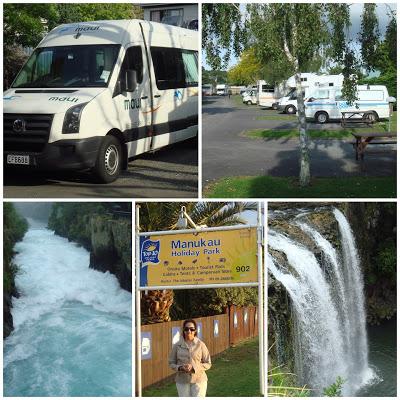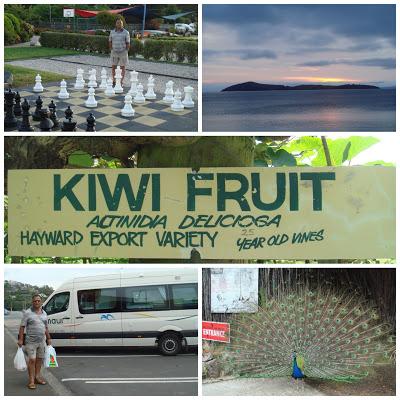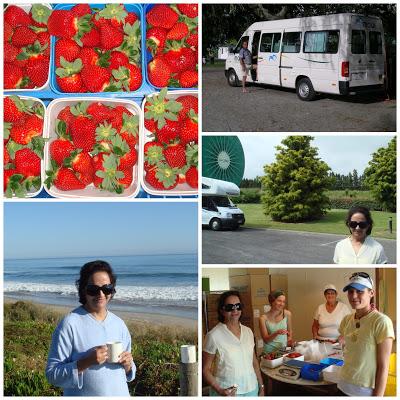
I come from a family of travellers. My parents did, not one but two Round the World trips at a time when most people who blog about their travel experiences weren't even born. I was, just clarifying, all of 4 years old at the time and accompanied them. Unfortunately I don’t remember much from those trips. So it comes as no surprise that they were also the first amongst my family and friends to head off on a campervan vacation. In their youth, mentally they are still younger than I am, they had gone around Europe in a campervan, but over the last few years their passion and excitement has taken them to New Zealand on two occasions, exploring the scenic country while enjoying the pleasures of having a mobile home. It also doesn't come as a surprise that now they are planning their third trip to the country in a similar fashion. So, I sat them down and asked them to chalk out the DOs and DON’Ts of a Caravan Holiday, primarily in New Zealand, but most of these points would hold true all around the world.
Pre-Planning:
When planning a caravan trip, the primary and most important point to keep in mind is that you should be passionate about driving and cooking. Although you can get by with eating out and not cooking your own food, it defeats the entire purpose of heading out to explore the world in a mobile home.
Once you have mentally prepared yourself, and I'm guessing you have already narrowed down the country you want to do this in, start planning your route. You do not have to have a fixed route, but it helps to have a general idea of where you want to go and the important spots that you must visit. Obviously the benefit of staying in a campervan is that you can change your mind during the course of your trip, but by planning in advance you will not only get an estimate duration for your trip, but it will also help you plan your rentals better as it is cheaper to pick-up and drop the campervan at the same location rather than picking it up at one point and leaving it another which will result in levying of charges.
When doing New Zealand it is advisable that you do the North and South Islands separately, preferably over two visits of roughly 15 days each. This gives you ample opportunity to explore the vast beauty of the country in all its glory and also keeps the trip more relaxed.
Bookings:
Now, with a route planned, the next step is choosing your campervan. Depending on the number of people you want per van, you are likely to have a few options based on the size and amenities in the camper. In the end it boils down to how comfortable you are. My parents during their first trip booked the smallest variation as it had been decades since my father had driven a big vehicle. During the second trip they braved themselves with a slightly flashier and grander vehicle which turned out to be much more comfortable.
A camper trip is a great way to spend a family vacation. The one benefit it gives is that even though if you don’t want to hire a big campervan and drive it around, you can always have one of the smaller ones along with the rest of the family renting a car and drive along together. Most of the camper parks also have rooms to rent along with common area kitchens and cafeterias, so as to accommodate those that are traveling in cars rather than campervans.
Insurance is of the uttermost importance and buying the full insurance, which is slightly expensive, is highly recommended. Having your campervan under complete insurance gives you peace of mind as all damages, including accidents, are covered under it. Moreover, since you are fully covered, the drop off procedure takes only a few minutes since the rental agency doesn’t bother checking for damages etc. Furthermore, important add-ons like road recovery service are included along with a full tank of gas and deck chairs (which are somewhat unnecessary if you have to pay for them).
 Taming the Beast:
Taming the Beast:
One of the first important purchases as soon as you land in the country is to buy a local SIM card and top it up. Not only is it helpful during your travel, but turns out to a lot cheaper when your family wants to contact you.
Getting back to the campervan, once you have the “beast” in your control it’s important to keep a few things in the back of your mind, such as unless you are okay with cleaning the toilet, it is best to use the same for only emergencies. Most camper parks have communal toilets which are clean and well maintained. Nevertheless, cleaning the campervan toilet and disposing off the waste is not a hard task.
Depending on your comfort level, an automatic campervan is recommended over a manual as my parents have had experience with both and the former makes driving a lot easier and relaxing.
The newer models of the campervans are becoming more and more stress free with additions like GPS and even internet. In case you do not have a fitted GPS, it is worth renting one unless you are an avid map reader. Having said that, the directions are well marked across New Zealand and locals are more than willing to help. Many seasoned travellers also carry televisions and other high-end fancy gadgets and electronics which personally might be going overboard unless you are traveling with kids and need these to keep them busy.
Inside the campervan you have all the amenities like cooking utensils which are included in the booking. Although there is a safe-deposit box installed, it is still best that you carry your passport and money when locking and leaving the campervan for a considerable amount of time, even at a camper park. Also it is under no circumstances advisable that you park and leave your campervan by the roadside for more than a few moments. Always park in designated parking spots or at the holiday parks that are spread across the country.
For the first timers, do not be hesitant about asking any and all questions from the renting company. My parents used Maui Rental during both their trips and were extremely satisfied with their service. Although they themselves will give you a little demonstration, but don’t hide away from asking anything that you might not understand or not know. In fact, it’s better to make a list of questions you have beforehand and keep it ready when taking possession of the campervan.
The Stay;
When deciding on where to park and stay ample options are available with numerous campervan sites available. Do keep in mind that during high season they fill up quickly. My parents used and recommend Top 10 when in New Zealand as their sites were well maintained with clean common bathrooms and kitchens. The more popular and bigger sites also have children’s play areas and gas stations.
One of the biggest benefits of the parks is their locations. They are almost always strategically situated, with some of them being right by the beach with gorgeous views and a gentle sea-breeze that is guaranteed to take away your driving aches and pains.
The best option is to book your sites in advance, but if you want to play it by the ear then you can always book your next stop before leaving the previous one. Staying with one organization has its benefits as the Top 10 Discount card gets you cheaper accommodation when you book your next spot.
 The Drive:
The Drive:
While driving a campervan it’s very important to take it easy. New Zealand is a nation with abundant natural beauty and sometimes one might get carried away. Always drive in your lane and at designated speeds. Once you have driven a little you will know what speed is handled the best by the campervan. There is hardly any traffic in New Zealand and you might end up driving alone for miles, but still it is important to stay within the speed limits.
It is common to see long lanes of cars when driving in New Zealand. Most people stay within the limits and never honk. Don’t try to overtake and get impatient. If there is a long line of cars behind your campervan, don’t get anxious. There are specific demarcated overtaking lanes after every few miles so use those only, in both cases.
When driving around plan your day-to-day activities so that you are on the road between 10:00 AM and 4:00 PM. On average you are likely to travel anywhere from 30 minutes to 3 hours maximum as this will give you ample time to explore the region and carry on to the next spot. This is also beneficial in getting a space at various parks in case you haven’t booked in advance. Avoid driving at night.
New Zealand is otherwise a very safe country and my parents met a number of friendly residents throughout both their trips. From a driving point of view, it is a very easy country to drive in with beautiful scenic drives and roads in excellent conditions being some of the main reasons for its popularity as a driving-holiday destination.
Eating and Making Merry:
Cooking food in an integral part of enjoying any campervan vacation. There are stores that can be found along the way and in cities to fill up on your cooking needs. When not in the mood to cook, there are plenty of restaurants and most campervan parks come with cafeterias and other dining options. As courtesy sake people even leave their unused food in the common kitchens of the parks, so it’s always best to do the same rather than throwing away unwanted things. Experimenting with the local wine is a must with the evening meal.
For vegetarians or lovers of Indian food, New Zealand has much to offer. My parents found many Indian restaurants during their trips in both the North and South Islands. Those in need for some Indian bread, can always pick up Naan or Paranthas from these restaurant and can always cook the rest themselves. There are food-courts in many places which offer a variety of good and cheap food.
The Experience:
A campervan holiday is a slightly different kind of experience that involves a bit of relaxation mixed with adventure. You have certain homely comforts while enjoying the benefits of being on your own to alter your itinerary at your will.
New Zealand has three major airport hubs with Christchurch in the South and Auckland and Wellington in the North that serve best as starting and ending points for your trip. When traveling in this beautiful country it goes without saying that one should respect nature, which is what New Zealand is all about.
The best time to plan your trip is in the months of March-April or November-December as it is neither too cold nor too hot and is also close enough to catch on some off-season deals.
A campervan holiday might seem intimidating at first, but it is a great way to see any country and really experience it from up close at a leisurely pace with your family. I think the fact that my parents are planning their third trip says it all.

